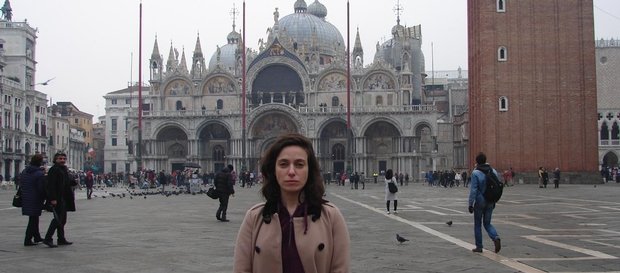
Dir: Rodrigo Guerrero | Cast: Paula Lussi, Margherita Mannino | Drama Argentina, France, Italy 75’
At the start of Rodrigo Guerrero’s atmospheric drama VENEZIA, Sofia (Paula Lussi) lies on a bed in a hotel room, sobbing gently and utterly alone. Her mobile buzzes, but she doesn’t answer. Later, as we see her pace through the winding, narrows streets of the eponymous city, the cause of her tears and solitude is slowly revealed, her loneliness signalling an absence in her life – and an absence felt in the film itself, for the story begins in media res, with a slow-burning sense of uneasy mystery.
As such, the opening raises a string of active questions whichwould not feel out of place in a thriller, but Guerrero instead uses these intrigues as hooks by which to propel an engrossing character study – a portrait of a lost woman attempting to find solace and understanding for what life has thrown her way.
Thankfully, and in contrast to so many other recent films, the opaqueness gradually lightens, allowing us a rich understanding of the problems faced by Sofia, as wonderfully conveyed through Lussi’s hypnotic performance. Indeed, the film’s only slight misstep is the inclusion of a scene which takes the focus momentarily away from Sofia, to give us an unnecessary insight into the life of Francesca (Margherita Mannino), one of several characters who Sofia encounters as she drifts through the city – for this is Sofia’s story, and it’s in following the minutiae of her journey (physical and emotional) that the film excels.
Filmed in striking 1.33:1 images, Venezia‘s evocative, observational style follows in the arthouse tradition which is too often described as ‘detached’ – it would be better, and more accurate, to say that Guerrero’s engrossing, tender film is unsentimental and devoid of emotional manipulation, and that it’s all the more impactful as a result. Understated and light on dialogue, Venezia reminds us that, so often, less is more – and, with a slender runtime of just 75 minutes, it also offers a further rejoinder to the bloated nature of much contemporary cinema. A real, subtle gem.
 Elsewhere in the programme, Sasha Collington’s LOVE TYPE D offered a very different, and much more light-hearted, portrait of a lonely woman: Frankie (Maeve Dermody), who has just been dumped for the 11th time in a row. Discovering a scientific theory that suggests her run of bad luck may be the result of genetics and, more specifically, a ‘loser in love‘ gene, Frankie sets about trying to cure herself. Slightly more high-concept than your average rom-com, Love Type D offers plenty of laughs and entertainment, frivolous though it may all be. ALEX BARRETT
Elsewhere in the programme, Sasha Collington’s LOVE TYPE D offered a very different, and much more light-hearted, portrait of a lonely woman: Frankie (Maeve Dermody), who has just been dumped for the 11th time in a row. Discovering a scientific theory that suggests her run of bad luck may be the result of genetics and, more specifically, a ‘loser in love‘ gene, Frankie sets about trying to cure herself. Slightly more high-concept than your average rom-com, Love Type D offers plenty of laughs and entertainment, frivolous though it may all be. ALEX BARRETT
EDINBURGH FILM FESTIVAL 19-30 JUNE 2019